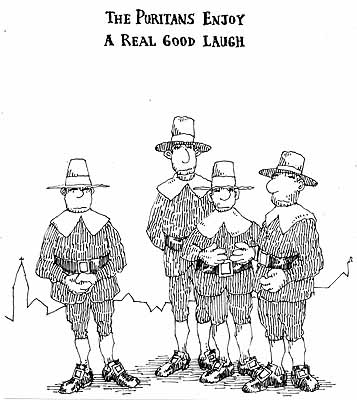The word “Puritan” has developed, over time, into a reproach. If someone is tagged a Puritan today, that supposedly means he is an austere, humorless, narrow-minded bigot. Yet what do most people really know about the Puritans who came over to America in droves, especially during the 1630s? Not much. What we have now is primarily a stereotype.
Puritans were far more diverse than the stereotype allows. Some, indeed, were lacking humor, but that might be because they were persecuted in the England of their day. Due to their desire to “purify” the Church of England of all vestiges of Catholicism, they were kept from all positions of influence by church authorities.
One Puritan, who publicly called out some Anglican ministers as cancers on the Body of Christ because of their unwillingness to push reform further, was given a sentence of life imprisonment, his family was dispossessed of all property, his nose was slit, and he was branded on his forehead with the letters “SS,” meaning “sower of sedition.”
I might lose my sense of humor in those circumstances.
Yet when, in 1630, a group of Puritans operating as the Massachusetts Bay Company, arrived on these shores, they were a brave lot, seeking to set up what they hoped would be a model society based on Biblical principles. Their leader on that first expedition, and their first governor, John Winthrop, gave a sermon on board their ship on the way over. It outlined what they intended to do. Some of his words have become well-known:
For we must consider that we shall be as a City upon a hill. The eyes of all people are upon us. So that if we shall deal falsely with our God in this work we have undertaken, and so cause him to withdraw his present help from us, we shall be made a story and a byword throughout the world.
Winthrop, and all on board with him, firmly believed they had a covenant with the Lord. He would fulfill His part, but the only way the covenant would come to fruition was for them to fulfill their side of it. They wanted to establish a community that old England would observe and imitate.
Near the end of his sermon, Winthrop explained that there was only one way for them to succeed. In words that the stereotype of Puritans won’t allow, he reminded them of this salient fact:
Now the only way to avoid this shipwreck and to provide for our posterity is to follow the counsel of Micah, to do justly, to love mercy, to walk humbly with our God. . . .
For this end, we must be knit together in this work as one man, we must entertain each other in brotherly affection, we must be willing to abridge ourselves of our superfluities, for the supply of others’ necessities, we must uphold a familiar commerce together in all meekness, gentleness, patience, and liberality.
We must delight in each other, make others’ conditions our own, rejoice together, mourn together, labour, and suffer together, always having before our eyes our commission and community in the work, our community as members of the same body.
So shall we keep the unity of the spirit in the bond of peace. The Lord will be our God and delight to dwell among us, as his own people, and will command a blessing upon us in all our ways.
Those are beautiful words. They reveal the heart of the Puritan enterprise. How well did these colonists live up to those lofty ideals? I’ll trace their history—their successes and their failures—in posts to come.

